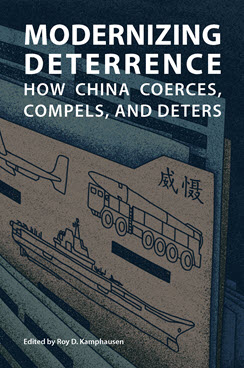“Struggle” as Coercion with Chinese Characteristics
The PRC’s Approach to Nonconventional Deterrence
This chapter examines how China engages in and conceives of deterrence and argues that the political guidance of the Chinese Communist Party (CCP) does not use the explicit language of deterrence or compellence but instead stresses the need for struggle and resolve.
EXECUTIVE SUMMARY
MAIN ARGUMENT
Over the past decade, the People’s Republic of China (PRC) has begun supplementing its long-standing suite of diplomatic and military deterrent signals with an increasingly diverse set of nonconventional tools for deterring or coercing other states and nonstate actors. A survey of the range of nonmilitary and nonconventional tools Beijing is deploying and of key CCP writings finds that CCP theory stresses the need for struggle and resolve in the face of challenges to China’s interests. As a concept central to “Xi Jinping Thought on Socialism with Chinese Characteristics,” engaging in struggle is a key means for PRC officials to signal fealty to the CCP and for the party to bolster its popular legitimacy. This can help explain why China persists in coercive campaigns that damage its international image and fail to change the behavior of the targets, as well as why CCP leaders may even judge such campaigns to be successful.
POLICY IMPLICATIONS
- Analysts of the PRC’s approach to deterrence should look beyond conventional military actors and actions to examine how actors throughout the PRC party-state conduct coercion using diverse tools of statecraft across different domains.
- Analysts need to examine not only how the PLA conceptualizes deterrence in its doctrine, but also how other PRC actors, especially senior leaders and intellectuals in the CCP, theorize about how to respond to threats to China’s interests.
- Beijing’s growing reliance on coercive tools of statecraft to struggle against perceived affronts to its interests may lead it to alienate other countries. Thus, U.S. policymakers could bolster positive economic and diplomatic engagement with countries that have been alienated by PRC coercion or that are concerned about becoming targets in the future.
Rachel Esplin Odell is a Foreign Affairs Analyst in the U.S. Department of State’s Bureau of Intelligence and Research.
This chapter relies solely on open sources, and the views expressed herein are the author’s own and do not necessarily represent the views of the U.S. government or the Department of State.


